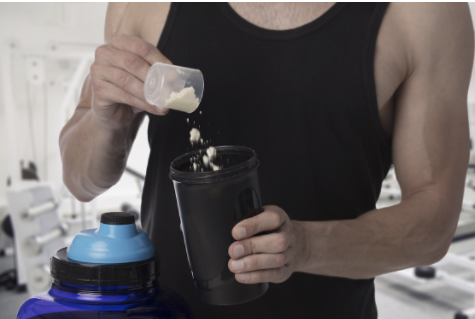

Every bodybuilder would want to know the secrets to bodybuilding. While a bodybuilding training routine is a key strategy for building bigger and stronger muscles, going the extra mile with some secret tips can help attain faster and better results. Creatine could be the secret key to building bigger, stronger, and bulkier muscles.
There are two common misconceptions about supplements. Some bodybuilders believe that supplements alone can do the magic of muscle building, ignoring the fact that nothing beats eating healthy diet meals containing enough protein. Some others are of the notion that supplements play no role in muscle building. Both notions are wrong.
Supplements help with muscle building. However, they should never be taken in place of a real balanced meal. Also, many supplements have been touted as ‘best for bodybuilding’. However, when it comes to bodybuilding, all supplements are not created equal. Some supplements may not be safe, some will take a longer period to see results while some are less effective. Supplements like creatine have been scientifically proven to help muscle building. Most bodybuilders will benefit from the muscle-building effects of creatine.
Creatine
Creatine is an organic compound that occurs naturally in muscle cells. It plays a role in recycling adenosine triphosphate (ATP), the energy currency of cells. Creatine carries out its role primarily in the brain and muscle tissue.
Creatine shares some similarities with amino acids. The body produces it from the amino acids- arginine and glycine. Different factors affect creatine levels in the body, e.g., exercise, muscle mass, meat intake, and levels of hormones like testosterone.
The body stores about 95 percent of creatine as phosphocreatine in the muscles. The remaining five percent creatine can be found in the brain, liver, and kidneys. Taking creatine supplements increases phosphocreatine storage. This is similar to storing energy in the cells since it helps the body produce the high-energy molecule- ATP.
ATP is the body’s energy currency. ATP provides the readily releasable energy that drives many processes in a living organism, such as muscle contraction. Thus, it is not a surprise that creatine plays a vital role in muscle building as it helps muscles generate the energy needed during high-intensity exercise or weight-lifting.
Studies have shown that creatine alters different cellular processes, which results in increased strength, muscle mass, and recovery.
Creatine’s Relationship To Supplements
Even though creatine occurs naturally in the body, it can still be consumed as a dietary supplement. People with low creatine levels will benefit from creatine supplements. Symptoms of low creatine levels include low muscle mass, dizziness, lack of strength, nausea, and weight loss.
Athletes that need increased muscle strength, such as sprinters, team sport athletes, and weight lifters, will also benefit from creatine supplements. Other sources of creatine include fish and red meat. Taking these foods can increase the levels of creatine in the body.
Creatine supplementation appears to be generally safe when taken at appropriate doses. However, as with every dietary supplement, it is best to opt for a product that follows the best-recommended manufacturing process; it should go through third-party testing. These steps are important to ensure you are purchasing a high-quality product.
Can creatine replace other supplements?
When it comes to muscle building, creatine does its magic. However, other supplements like beta-alanine, protein, and EAAs offer similar benefits as creatine.
Creatine is great for muscle building, but it doesn’t have to replace other supplements. Each supplement is unique and has a distinct role it plays in the body. It all boils down to what works for each individual. If you are already on a supplement that works for you and meets your needs, you need not replace it with creatine.
Should you take other supplements with creatine?
Taking creatine and supplements like whey protein is safe. However, taking other bodybuilding supplements with creatine does not necessarily mean you will experience benefits beyond what you will get from taking just one. For instance, a study showed that 18 women participating in resistance training who took creatine and whey protein for eight weeks did not experience any difference in strength and muscle mass compared to those that took only whey protein.
Someone might ask, ” Can I take creatine with vitamin supplements?” It is best to consult your physician in this case. Also, it is important to take all supplements in the proper dosage and as directed.
Is it safe to take creatine with medications?
If you are suffering from a chronic health condition, you should talk to your doctor before taking any supplement, including creatine supplements.
Also, if you are on certain medications, such as those that affect kidney and liver functions, it would be best to avoid creatine supplements. Some drugs that may interact with creatine include gentamicin, cyclosporine, tobramycin, and anti-inflammatory medications like ibuprofen.
Ancient Creatine
Ancient creatine, also called Ancient Strength Creatine, is a supplement that combines three different creatine forms to meet the body’s need for creatine supplementation. Ancient creatine will be beneficial for people who participate in intense training and workout sessions.
Each serving of Ancient Strength Creatine contains Creatine Monohydrate, Creatine Pyruvate, and Creatine HCL in a more readily reusable form. It provides the body with what it needs to replenish lost ATP immediately and also increases the production of IGF-1, an insulin-like growth factor-1 that helps promote tissue growth and development as well as normal bone strength.
While ancient creatine has been touted as an effective supplement, it must be taken with caution. Its label indicates that it has not been evaluated by the Food and Drug Administration (FDA) and is not intended to diagnose, cure, treat or prevent any disease. It might not be 100% safe to use it with other supplements, which is why users should consult their physician before using the product.

How To Take Creatine
To maximize creatine stores in the muscles, bodybuilders usually go through a creatine loading phase. The creatine loading phase is a short period when you consume a substantial amount of creatine to saturate your muscles rapidly.
A common approach to creatine loading is to take 20 grams of creatine daily for five to seven days. The 20 grams will be divided into four 5-gram servings of creatine (to be taken morning, afternoon, evening, and night) each day.
You can also determine your daily loading phase dose by multiplying your weight in kilograms by 0.3. For example, if you weigh 60kg, multiply 60 by 0.3. This means you should consume 18 grams of creatine daily if you are going through the creatine loading phase. A study showed that taking creatine supplements in this way can boost creatine stores by 10-40 percent.
Note that creatine loading is not necessary to boost your total creatine levels. Taking creatine supplements in lower doses once a day is also an effective strategy for maximizing muscle creatine stores, except that it might take longer. With lower doses of creatine supplement daily, it could take about three additional weeks to maximize your muscle stores compared to using the creatine loading method.
Once you have attained muscle saturation, you can take lower doses of creatine to maintain the muscle stores. Usually, maintenance doses will range from 2-10 grams daily.
On days you exercise, you can take creatine shortly before your workout session, after your workout, or any other time. While a study found a greater increase in muscle mass for people who took creatine supplements after exercise, another study found no difference between taking it before or after exercise.
Health Benefits Of Creatine
Creatine is one of the most popular supplements used by bodybuilders because of its potential to build muscle mass and improve strength. Another reason why creatine is popular is its accessibility. Creatine is available as powder, energy bars, tablets, drink mixes, etc.
Below are ten powerful benefits of creatine.
- It plays a vital role in ATP formation; thus, helping the muscles produce more energy.
- It supports other muscular functions, such as increasing insulin-like growth factor 1 (IGF-1) and reducing the levels of myostatin which inhibits muscle growth.
- It speeds muscle growth over time.
- It improves high-intensity exercise by increasing strength, muscle endurance, sprint ability, muscle mass, brain performance, and fatigue resistance.
- It may reduce fatigue and tiredness.
- It may be beneficial to people with type 2 diabetes, as research suggests that it may help lower blood glucose levels.
- It plays a crucial role in brain function and health.
- It may help patients suffering from Parkinson’s disease by preventing a drop in dopamine levels.
- It may help combat other neurological disorders.
- It is typically easy and safe to use.

Are There Side Effects Of Creatine?
It is usual for drugs to have side effects, but what about creatine supplements. Studies have suggested that creatine is one of the safest supplements in the market; however, there are some purported side effects of creatine. Some of the suggested side effects of creatine include:
- Weight gain
- Fever
- Muscle cramps
- Bloating
- Digestive problems
- Dehydration
- Fatigue
- Anxiety
- Difficulty breathing
- Headache
- Diarrhea
- Rash
- Stomach upset
- Nausea and vomiting
- Kidney problems
Conclusion
Creatine helps the muscles to generate usable ATP. It also prevents a drop in muscle PH levels; therefore, delaying fatigue. This means this supplement will be an excellent choice for every bodybuilder. With creatine supplement, you can work out for an extended period, gain more strength and recover faster from your workout sessions.






















You must be logged in to post a comment Login